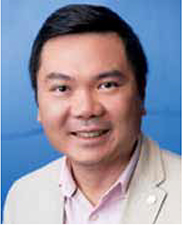Respect. Honor. Dignity.
 |
| Dr Matthew Chow |
I appreciate everyone’s feedback about my President’s Comment columns and President’s Blog posts. If you have time, write to me to share your thoughts. This time, I want to reflect on something a little more personal: values. They guide us in all aspects of our life—they reflect our sense of right and wrong, they help us grow and develop both personally and professionally, and they are a driving force behind our daily decisions. But just as we as individuals differ, so do our values. I’d like to share with you three values that guide how I treat others and make sense of our increasingly complex world. They are respect, honor, and dignity.
Respect. Growing up I followed the golden rule: “Treat others as you want to be treated.” This is an adage shared by many cultures. Later, I was introduced to the upgraded platinum rule: “Treat others as they would like to be treated.” This is fundamentally different. The golden rule is based on my standard. What I want. The platinum rule is about your standard. What you want. We need to consider, ask, and learn how people want to be treated. In the same way that I cannot tell you how you should feel about something, I cannot tell you how you should be treated. That is for you to tell me. This is the essence of respecting someone.
Honor. This is a bit harder to describe as it can mean different things to different people, cultures, and generations. I describe it as a pattern of certain behaviors: honorable people keep their word, maintain confidences, tell the truth, and admit when they are wrong. Honorable people engage in conflict in a thoughtful, considerate way. You could say that honorable people like to play fair. Children seem to have a strong sense of what is honorable, or at least what is not. They react almost viscerally to perceived unfairness, underhandedness, and dishonesty.
Lastly, dignity. This is the state of deserving respect and honor. It is deeply tied to the value we feel as human beings and the ability we have to make our own choices in life. And while dignity is something that we each have owing to our very existence, there are times when we are made to feel like it has been taken away—we are made to feel small, insignificant, and powerless. This loss weighs more heavily than the loss of any material possession or title. It is as if something from our very being has been stripped away. So, imagine a world in which we all sought to protect and even enhance one another’s dignity. We would raise each other up. We would lend one another strength. We would seek to share power rather than to take it or horde it. We would never let anyone feel small and insignificant.
We exist in a world with increasingly complex problems, problems that money and technology alone cannot solve. In such an uncertain world, what we value and how we treat one another is something that we can be certain of. When I think about concepts such as equity, diversity, inclusiveness, antiracism, and reconciliation, I sense a common theme. Respect. Honor. Dignity. Their absence is acutely felt. Their loss, a traumatizing and sometimes enduring experience. But we can make a difference by asking people how they want to be treated, behaving in an honorable fashion, and cherishing one another’s dignity.
—Matthew C. Chow, MD
Doctors of BC President



excellent article ! food for thought. Good leadership example